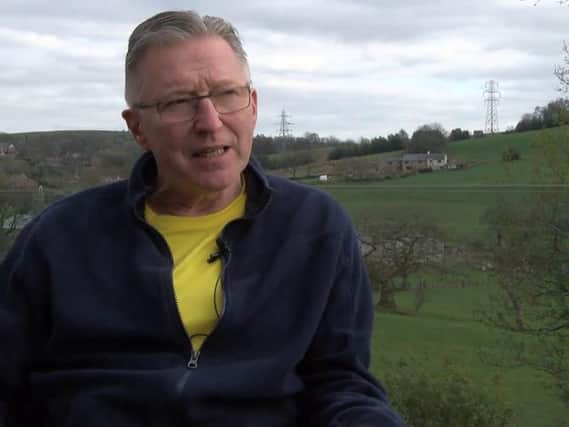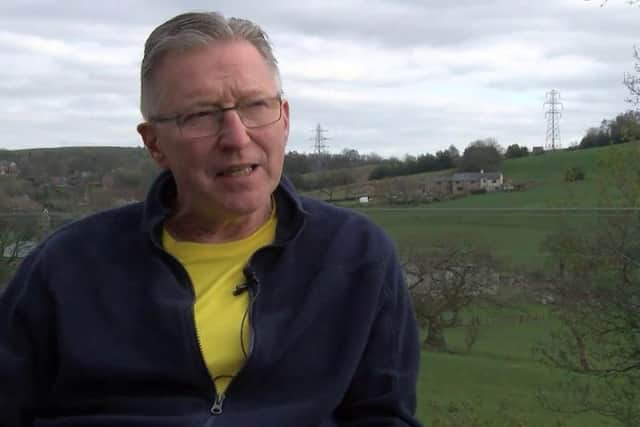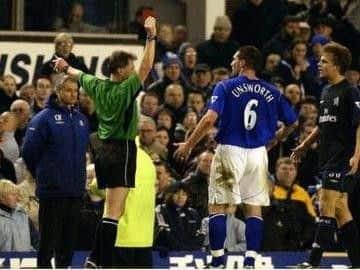"I was dead for one minute and 40 seconds", reveals ex-Premier League referee who collapsed in tunnel at Turf Moor


It was a normal Monday afternoon for ex-Premier League referee Eddie Wolstenholme.
A trip from his beautiful Blackburn bungalow to the FA’s base at St George’s Park, he headed back up the motorway to Burnley’s Turf Moor for their Premier League clash against Newcastle United, on November 26.
Advertisement
Hide AdAdvertisement
Hide AdDue to chaotic traffic on the M6, he only arrived at the Clarets’ stadium almost an hour later than expected, at 6:50pm.


But as the clock struck 7pm, 45-minutes before kick-off, his life flashed before his eyes and he collapsed in the tunnel.
Speaking exclusively to UCLan Live, the 64-year-old said: “I was rushing because I was late.
“We went in the dressing rooms; the managers came in with the captains and after that, the last person’s hand I remember shaking was Rafa Benitez.
Advertisement
Hide AdAdvertisement
Hide Ad“It just felt like tin foil went over my glasses and that’s the only thing I really remember.


“I then collapsed and after that I don’t remember anything, I woke up with paramedics slapping my face.”
Those few minutes in the Turf Moor tunnel are still a huge blur but the lifelong Preston North End fan now knows he had stopped breathing and medics had shocked his heart back to life using a defibrillator.
Eddie, who refereed in the Premier League from 2001-2003, said “I ended up on a stretcher in the tunnel going to hospital because I’d had a heart attack and was dead for one minute and 40 seconds.
“They were shouting, “Eddie, are you alright?”
Advertisement
Hide AdAdvertisement
Hide Ad“About five minutes after the incident I woke up and going to Blackpool I was awake all the way, but I was just tired and wanted to sleep.”
Eddie was taken in an ambulance to Blackpool Victoria Hospital, which has a specialist cardiac unit.
Kick-off at Turf Moor, where Eddie was working as a coach with the Select Group of Premier League referees, was delayed for half-an-hour.
Eddie added: “When I got to Blackpool, I’d been in for some tests for an hour or two and they said you’re going to have to have a heart bypass.”
Advertisement
Hide AdAdvertisement
Hide AdNow, four months on he wants to thank those who saved his life.
“I owe a lot to the Burnley and Newcastle doctors, paramedics, managers and match officials for the way they dealt with me on the day.
“I couldn’t thank all the medical staff enough, they couldn’t have been any better with me and while I was in hospital, every two or three days Sean Dyche sent me a text.
“The doctors from both clubs got in touch and the day before the operation Rafa Benitez got in touch with me.”
Advertisement
Hide AdAdvertisement
Hide AdRelaxing at home, Eddie tells how he has been involved in the game most of his life.
There are two cabinets filled with trophies and medals he has received and propped against the wall are a pile of stacked footballs by a drawer.
His walls boast signed, framed shirts from the likes of David Seaman, Thierry Henry, Kevin Ball and with a chuckle he confesses he had to give away three Leeds United’s shirts of Danny Mills, Mark Viduka and Harry Kewell, because there wasn’t room for them.
“Thierry used to never shut up,” he joked. “Patrick Vieira’s signature is on there, he was my type of player, a true leader who just got on with every match.”
Advertisement
Hide AdAdvertisement
Hide AdEddie had to show the same level of fight as that of the former Arsenal captain as he battled back to health following his triple heart bypass operation.
When asked whether at any point he was scared, he was quick to say it never entered his mind, instead insisting his family was his biggest concern.
“I felt sorry for my family mostly,” he says, surrounded by photos in his living room of memorable days and holidays.
“My family weren’t at the game, but when I got to hospital my wife was there.
Advertisement
Hide AdAdvertisement
Hide Ad“My daughter lives in Singapore and my son had just gone on holiday to Brazil, he’d got off the plane, rang up panicking like mad because he’d received loads of messages about his dad.
For someone who has gone through something so serious, he seems incredibly unfazed about his experience that night as he sits on the balcony above his pristine garden.
It overlooks fields of land in a peaceful area of Blackburn – the Preston-born official doesn’t take any of that for granted now.
“It makes you appreciate life, every day and how lucky you are,” he said. “Talk about being in the right place at the right time.
Advertisement
Hide AdAdvertisement
Hide Ad“I certainly don’t feel sorry for myself, I feel very, very lucky because a lot of people wouldn’t have come through like I did.
“I actually feel better health wise now than I’ve felt for the last two years.”
His health continues to be monitored as he attends rehabilitation every Wednesday at hospital, on top of 14 weeks of sessions at the local gym with a trainer.
As much as anything, the support of the football community is what shone out for the former engineering fitter.
Advertisement
Hide AdAdvertisement
Hide Ad“It’s quite interesting because with football managers, players, everyone goes on about what they make from the game but when something like this happens everyone comes together.
“Brighton, Manchester City, Manchester United got in touch – there were loads of clubs, players current and former.
“Anthony Taylor, the referee on the day, was brilliant and the general manager at the Professional Game Match Officials Limited (PGMOL), Mike Riley, was sat there at hospital when I woke up.”
After a whirlwind few months which has really put life into perspective, it’s back to the day-job as the coach for the Select Group of Referees, a job he absolutely adores and one he wouldn’t change for the world.
Advertisement
Hide AdAdvertisement
Hide Ad“I’ve had great support and they said I’d most likely get back to work in June, but I managed to go back on March 1.
“Work left it to me when I could go back on medical advice, the doctor said I was so good I could go back.
“For me, it’s raised the importance of defibrillators, because it saved my life, I know that I wouldn’t be here without that defib and everyone at Burnley that day.”
Jane Atkinson, Community Resuscitation Development Officer for the North West Ambulance Service (NWAS), said: “The ambulance service works with Burnley FC to provide medical assistance on match days and therefore we were thankfully able to provide speedy assistance to Eddie alongside the club doctor which gave him the best possible chance of survival.
Advertisement
Hide AdAdvertisement
Hide Ad“It was a real team effort and I’m over the moon that Eddie has made a good recovery.
“In the event of a cardiac arrest, every single second counts and early CPR and defibrillation using an automatic external defibrillator (AED) can mean the difference between life and death.
“Eddie was extremely lucky that medical assistance was very close by when he collapsed but it’s really important that people in the community are also aware of the simple skills needed to save a life and are willing to start CPR before an ambulance arrives.
“We have lots of information on our dedicated website, http://www.cardiacsmart.nwas.nhs.uk/.”
Advertisement
Hide AdAdvertisement
Hide AdDr Shajil Chalil, Consultant Cardiologist and Head of Department (Cardiology) from the Lancashire Cardiac Centre at Blackpool Victoria Hospital, said: “We are delighted to see that Eddie is recovering well from treatment at the centre.
“He was seen by a number of specialist staff who made sure he was given the best treatment possible for his condition.’’
FACTFILE:
Born in 1954, Preston, Lancashire.
He took up refereeing in 1978, after an injury forced him to give up playing non-league football for Bamber Bridge, known as Walton-le-Dale F.C. at the time.
Refereed famous First Division Play-Off final between Charlton and Sunderland in 1997/98 season, which finished 4-4 after extra time and 7-6 to Charlton on penalties.
Advertisement
Hide AdAdvertisement
Hide AdAlso refereed ‘Battle of Bramall Lane’ in 2002, a game between Sheffield United and West Brom, where the game was abandoned after 77 minutes because United had fewer than seven players on the pitch after three had been sent off and a further two were then injured.
Professional Premier League referee between 2001 and 2003.
Fourth official for England v Australia in 2003.
This story appeared on UCLan Live – a website run by journalism students at the University of Central Lancashire in Preston.